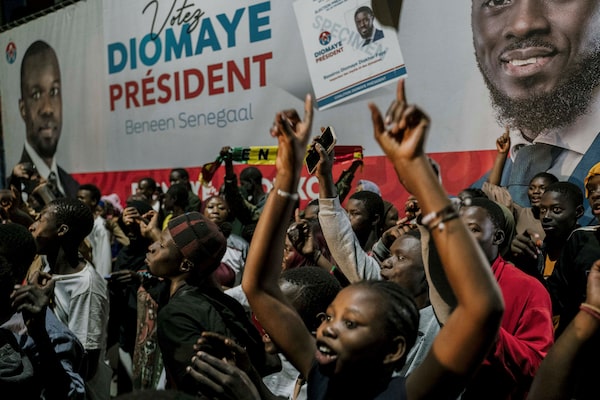
People gather outside anti-establishment candidate Bassirou Diomaye Faye's headquarters in Dakar on March 24 as results remain expected during the Senegalese presidential elections.CARMEN ABD ALI/Getty Images
Just 10 days after walking free from prison, opposition candidate Bassirou Diomaye Faye has jumped into a strong lead in early results from Senegal’s presidential election.
Thousands of Mr. Faye’s supporters were celebrating in the streets of Senegal’s cities on Sunday night as they awaited the official results.
Authorities had detained Mr. Faye for nearly a year on accusations of “defamation” and “insurrection,” after he wrote a social-media post that criticized the justice system in the West African country. Now he seems on the verge of becoming president.
Western and African governments are watching the election closely because Senegal is seen as a bulwark for democracy in West Africa, at a time when military coups have proliferated in the region. Six putsches have taken place in four West African countries over the past three years, leading to greater Russian military influence in several of the countries.
Senegal’s election had been scheduled for last month, but President Macky Sall sought to postpone it to the end of this year. The delay sparked fears that he would extend his rule beyond the end of his constitutional mandate in April. Several opposition leaders were detained or disqualified from running in the election, adding to the concerns that Mr. Sall was trying to cling to power.
After huge street protests and a court challenge, however, Mr. Sall agreed to hold the election on Sunday and to step down on the scheduled date of April 2.
While there are 19 candidates in the presidential contest, the early results on Sunday showed that it was essentially a two-candidate race between Mr. Faye and the ruling party’s candidate, former prime minister Amadou Ba.
Late on Sunday night, several other candidates said Mr. Faye had won the election. Official results from the election are expected to be released on Tuesday.
There were long queues of voters at polling stations across the country on Sunday. Nearly 7.4 million people were registered to vote in a population of 18 million. If no candidate gains 50 per cent of the vote, a runoff between the two leading vote-getters will be held next month.
Mr. Faye’s popularity – especially among young urban voters – shows the extent of dissatisfaction with the high rate of unemployment and widespread poverty and corruption in Senegal.
Mr. Faye has pledged to renegotiate Senegal’s mining and energy investment deals if he wins, and to consider introducing a new national currency to move away from the economic influence of France, the country’s former colonial power.
He is a close ally of firebrand opposition politician Ousmane Sonko, who was barred from the election because of a defamation conviction. Both politicians were in detention until March 14, hobbling Mr. Faye’s election campaign and provoking anger among their supporters.
In a country where 60 per cent of the population is younger than 25, the strong support from young Senegalese voters could be Mr. Faye’s crucial advantage. Thousands of people have flocked to the 44-year-old candidate’s campaign rallies in recent days.
His campaign was given another major boost on Friday when former president Abdoulaye Wade endorsed him.
Mr. Sall’s chosen successor, Mr. Ba, has “generated little enthusiasm among voters,” according to Amy Niang, a political scientist at the Council for the Development of Social Science Research in Africa, in a commentary last week.
The 62-year-old candidate is a veteran civil servant who has never held elected office. “He symbolizes the status quo,” Ms. Niang said.
For many Senegalese, the most important achievement this month was simply that the election was held without too much delay, despite the government’s earlier attempts to postpone it to the end of the year.
“This is good news for Senegalese democracy,” Senegalese journalist Borso Tall wrote last week on the website of Vanguard Africa, a pro-democracy organization. “That citizens have been given back their freedom to vote and to elect a new president is a victory for the country and its reputation.”
Afolabi Adekaiyaoja, an analyst at the Centre for Democracy and Development, a West African think tank, said the situation has shown the importance of strong democratic institutions in Senegal. It shows “the need for civil society and advocacy groups to remain vigilant and observant, and the power of citizen movements in democratic states,” he wrote in a recent commentary.
Western leaders have had a similar view of the election. In a social-media post, the Canadian embassy in Senegal told the people of the country: “Your commitment to democracy and your voice will shape the future.”
U.S. Senator Jim Risch, the ranking member of the Senate foreign relations committee, said the election had “enormous implications” for the region. “It is crucial a free, fair and peaceful vote happens,” he said on social media.
The administration of U.S. President Joe Biden “should act swiftly to hold any election spoilers accountable,” he said.
 Geoffrey York
Geoffrey York